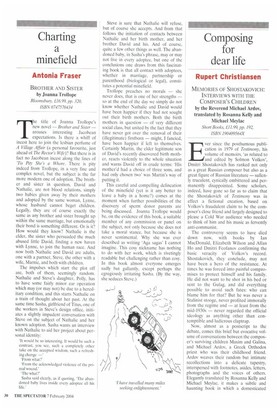Charting a minefield
Antonia Fraser
BROTHER AND SISTER by Joanna Trollope Bloomsbury, £16.99, pp. 320, ISBN 0747570434 The title of Joanna Trollope's new novel — Brother and Sister — arouses interesting Jacobean expectations. Is there a whiff of incest here to join the lesbian perfume of A Village Affair (a personal favourite, just ahead of The Rector's Wife)? But there is in fact no Jacobean incest along the lines of 'Tis Pity She's a Whore. There is pity indeed from Trollope, in a very fine and complex novel, but the subject is the far more modern one of adoption. The brother and sister in question, David and Nathalie, are not blood relations, simply two babies given away by their mothers and adopted by the same woman, Lynne, whose husband cannot beget children. Legally, they are of course exactly the same as any brother and sister brought up within the same marriage, but emotionally their bond is something different. Or is it? How would they know? Nathalie is the elder, the sister who persuaded the much abused little David, finding a new haven with Lynne, to join the human race. And now both Nathalie and David are adults, one with a partner, Steve, the other with a wife, Mamie, and both with children.
The impulses which start the plot off are, both of them, seemingly random. Nathalie and Steve's daughter, Polly, has to have some fairly minor ear operation which may (or may not) be due to a hereditary condition, and this starts Nathalie on a train of thought about her past. At the same time Sasha, girlfriend of Titus, one of the workers in Steve's design office, initiates a slightly impudent conversation with Steve on the subject of Nathalie and her known adoption. Sasha wants an interview with Nathalie to aid her project about personal identity:
'It would be so interesting. It would be such a contrast, you see, such a completely other take on the accepted wisdom, such a refreshing change —.
'From what?'
'From the acknowledged violence of the primal wound.'
'The what?'
Sasha said clearly, as if quoting, The abandoned baby lives inside every adoptee all his life.'
Steve is sure that Nathalie will refuse, hut of course she accepts. And from that follows the initiation of contacts between Nathalie and her birth mother, and her brother David and his. And of course, quite a few other things as well. The abandoned baby, in Sasha's phrase, may or may not live in every adoptee, but one of the conclusions one draws from this fascinating book is that all contact with adoptees, whether in marriage, partnership or parenthood (biological or legal), constitutes a potential minefield.
Trollope preaches no morals — she never does, that is one of her strengths — so at the end of the day we simply do not know whether Nathalie and David would have been happier if they had not sought out their birth mothers. Both the birth mothers in question — of very different social class, but united by the fact that they have never got over the removal of their (illegitimate) firstborn — might, I fancied, have been happier if left to themselves. Certainly Martin, the elder legitimate son of David's recently discovered birth mother, reacts violently to the whole situation and warns David off in crude terms: 'His motheed had a choice of three sons, and had only chosen two' was Martin's way of putting it.
This careful and compelling delineation of the minefield (yet is it any better to leave a baby in a home?) comes at the moment when further possibilities of the discovery of sperm donor parents are being discussed. Joanna Trollope would be, on the evidence of this book, a suitable member of any commission or panel on the subject, not only because she does not take a moral stance, but because she is never sentimental. Why she was ever described as writing 'Aga sagas' I cannot imagine. This cosy nickname has nothing to do with her work, which is rivetingly readable but challenging rather than cosy. In this book almost everyone emerges sadly but gallantly, except perhaps the egregiously irritating Sasha. (By the way, she seduces Steve.)


























































 Previous page
Previous page